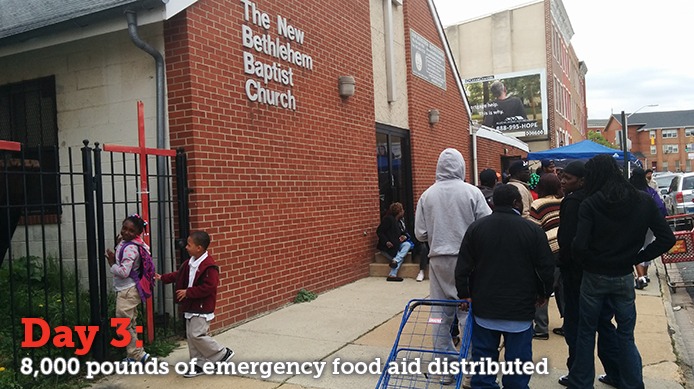Providing Steady Relief in Baltimore

After two days of emergency food distributions in the heart of Baltimore, the Maryland Food Bank wrapped up the work-week with yet another delivery of food into the West Baltimore community. While the food bank offices close on Saturday and Sunday, our operations team will be providing emergency hunger relief to communities in urgent need throughout the weekend.
Amid sidewalks and chain-link fences, a diverse group of volunteers gathered in a patch of green grass, where they had set up an impromptu emergency food center.
During today’s event, the Maryland Food Bank provided emergency food aid to the New Bethlehem Baptist Church in Sandtown-Winchester—primarily distributing fresh produce like carrots, apples, potatoes, and onions as well as dry goods of all kinds.
“Yesterday we got 23,000 pounds of food from the Maryland Food Bank , and even in the rain we had 200 people standing in line because the need is just that great,” said Delegate Antonio Hayes, who had been central to the hunger-relief efforts in District 40. “So we’re so grateful to be doing this again today.”
The church was located on a narrow road, so our truck driver, Roy, had parked on the side street and had made nearly a dozen treks—from the truck, onto the sidewalks, and finally to the church stoop where volunteers from all across Baltimore helped unload and set up the food.
“It’s been a really incredible week for me, seeing so many people come together to support each other and their communities,” said Brooke Lierman, a civil rights attorney and state delegate for South and Southeast Baltimore, who was also helping move food on site. “The people are especially in need of food, right now—always—but especially today.”
And it was true. The community that had been hit hardest by this week’s events was already among the most food-insecure regions in all of Maryland.
“Here in communities like Sandtown, it was a food desert before the protests, but a lot of them depended upon their local convenience stores,” said Hayes. “So with those small businesses being destroyed, they really don’t have access to things like food.”
Get updates on our progress in the fight against hunger
Want to see how your involvement directly impacts the well-being of your neighbors in need? Get the latest news sent to your inbox.






